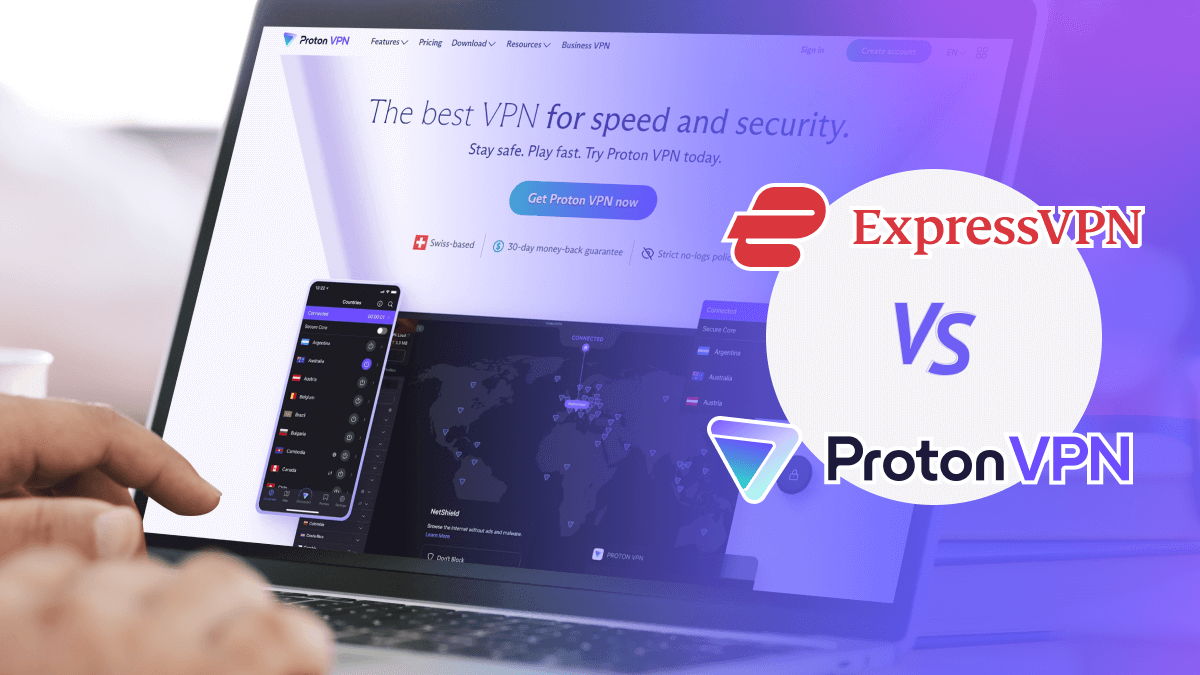
Proton VPN vs ExpressVPN in 2025: Features, Pricing, VPN Servers & More
- Table of Contents
- Proton VPN vs ExpressVPN: Comparison at a Glance
- My Expert Opinion: Is Proton VPN or ExpressVPN Better?
- Security
- Privacy
- Key Features
- Speeds: Upload, Download and Ping
- Streaming Performance
- Server Network
- OS Support & Usability
- Plans & Pricing
- Customer Support
- Conclusion: Why I Think ExpressVPN Wins Overall
- Methodology: How I Compared ExpressVPN and Proton VPN
- Other VPN Alternatives I Like
- FAQ: ExpressVPN vs Proton VPN Comparison
Quick Summary: Proton VPN vs ExpressVPN
The main differences between ExpressVPN and Proton VPN are that ExpressVPN has a bigger server network, it works with more devices, and it’s slightly better for privacy. Grab your ExpressVPN subscription today and test it out with a 30-day money-back guarantee.
Winner!
Proton VPN vs ExpressVPN is a battle between two of the best VPNs. ExpressVPN has been around since 2009, and Proton VPN started operating in 2017, so they’re not greenhorns. However, while ExpressVPN’s longevity carries some weight, this comparison shows that the gap between these two providers isn’t that huge.
Both VPNs have outstanding security and privacy features that ensure your online activities remain for your eyes only. They can also unblock geo-restricted content and are compatible with multiple operating systems. It’s therefore understandable why anyone would have a hard time choosing between the two — and that’s where I come in.
- Money-Back Guarantee30 DaysWorldwide Server Amount1500 Servers in 61 Countries
- Money-Back Guarantee30 DaysWorldwide Server AmountOver 3,000 servers in 105 countries
Proton VPN vs ExpressVPN: Comparison at a Glance
If you want to explore both of these VPNs in depth, be sure to check out our ExpressVPN review and Proton VPN review. In the meantime, here’s a quick overview of the results of this head-to-head clash.
| Criteria: | Wins | ExpressVPN | Wins | Proton VPN |
|---|---|---|---|---|
| Security | ✅ | -Lightway -IKEv2 -OpenVPN | ✅ | -WireGuard -IKEv2 -OpenVPN -Stealth |
| Privacy | ✅ | -Audited no-logs policy -RAM-only servers -No history of breach -No logs in seized servers | ✖️ | -Audited no-logs policy -No RAM-only servers -No history of breach |
| Features | ✖️ | -8 devices -Kill switch -Split tunneling -Ad & malware blocker -Automatic obfuscation | ✖️ | -10 devices -Kill switch -Split tunneling -Ad & malware blocker -Obfuscation -Port forwarding -VPN accelerator -Secure Core servers |
| Speed | ✅ | Av. download speed: 26% loss Av. upload speed: 3.5% loss | ✖️ | Av. download speed: 19% loss Av. upload speed: 23.5% loss |
| Streaming | ✅ | -Netflix -Hulu -Amazon Prime Video -Max -Disney+ -BBC iPlayer -Peacock TV | ✅ | -Netflix -Hulu -Amazon Prime Video -Max -Disney+ -BBC iPlayer -Peacock TV |
| Server Network | ✅ | 163 locations in 105 countries | ✖️ | 119 locations in 91 countries |
| Plans & Pricing | ✖️ | $6.67/month for 15 months | ✅ | $4.49/month for 24 months |
| OS Support | ✅ | -Windows -macOS -Linux -Android -iOS -Browsers -Fire TV -SmartDNS -ExpressVPN Aircove | ✖️ | -Windows -macOS -Linux -Android -iOS -Browsers -Fire TV -Android TVs -Routers |
| Support | ✅ | -Live chat -FAQs -Tutorials | ✅ | -Paid Live chat -FAQs -Knowledgebase |
| TOTAL WINS | 7 | 6 |
My Expert Opinion: Is Proton VPN or ExpressVPN Better?
ExpressVPN is better than Proton VPN, but the disparity isn’t that big. For starters, ExpressVPN has a superior server network that’s spread across 163 locations in 105 countries, compared to Proton VPN’s 119 locations in 91 countries. So, unblocking content with ExpressVPN is easier in more places.
Another area where ExpressVPN slightly outshines Proton VPN is privacy. It’s the only VPN in this comparison with RAM-only servers — this eliminates the chances of your browsing data being seized since these servers are periodically wiped clean. Still, Proton VPN honors a strict no-logs policy, which is sufficient to keep your data hidden from other entities.
ExpressVPN also offers better device compatibility than Proton VPN, thanks to ExpressVPN Aircove — the only router that comes with the VPN preinstalled and an app to manage it. ExpressVPN is also the only provider here that offers SmartDNS,a vital feature if you want to use the VPN on smart TVs that don’t have native apps, like Samsung and LG.
I know heaping too much praise on ExpressVPN makes it sound like Proton VPN was on the receiving end in this duel. However, this wasn’t as one-sided as it may seem.
I Recommend Proton VPN For:
- People on a budget: Proton VPN is cheaper and offers a free version without monthly data caps, which lets you access five free locations.
- Large households: Proton VPN allows up to 10 simultaneous device connections, making it ideal for large groups of people.
- Streamers and gamers: Proton VPN is slightly faster and perfect for gaming, streaming and torrenting.
- $4.49/month for 24 months
I Recommend ExpressVPN For:
- Extra privacy: ExpressVPN has RAM-only servers. It’s never been breached and has been audited many times, making it more trustworthy.
- Multiple operating systems: ExpressVPN has a better compatibility range with more router support, including the best router VPN app on the market.
- New users: ExpressVPN is one of the most user-friendly VPN apps, an ideal option for people who have never used a VPN.
- $6.67/month
Security
ExpressVPN and Proton VPN encrypt your internet connection, preventing others from monitoring your online movements. They also share features aimed at DNS leak protection. Here’s a table showing the different types of security available for each VPN.
| Features: | ExpressVPN | Proton VPN |
|---|---|---|
| Protocols | Lightway, OpenVPN, IKEv2 | WireGuard, OpenVPN, IKEv2, Stealth |
| Encryptions | AES-256, ChaCha20 | AES-256, ChaCha20 |
| Kill Switch | Yes | Yes |
| Private DNS | Yes | Yes |
| Ad & Malware Blocker | Threat Manager, Ad Blocker, Parental Controls | NetShield Ad Blocker |
VPN Protocols
Proton VPN has four protocols. OpenVPN is available on Windows, Android and Linux. Next up is WireGuard, which offers the best speeds and is available on Windows, macOS, Android and iOS. IKEv2 is offered on macOS, and while it has amazing speeds, it’s not as fast as WireGuard.
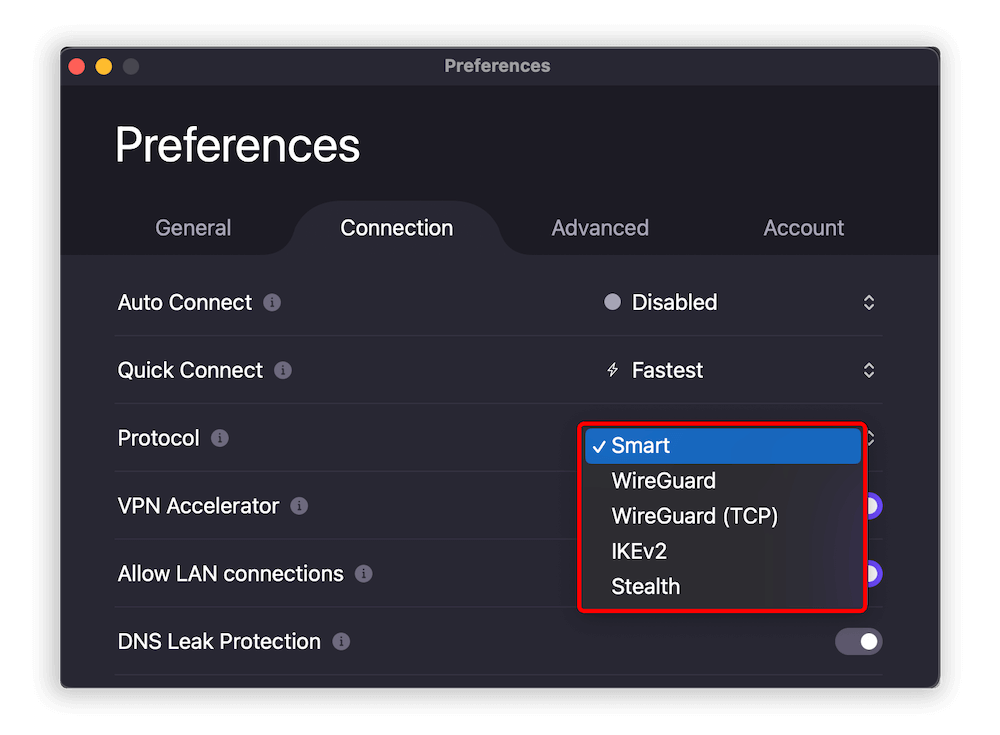
The final protocol — called Stealth — was developed by Proton VPN itself.It helps you access censored sites by making your VPN traffic look like a regular HTTPS connection, letting you bypass networks that block regular VPN protocols. Proton VPN’s Stealth protocol is based on WireGuard, and I found that it provides comparably fast speeds.
ExpressVPN has three protocols. There’s OpenVPN on Windows, macOS and Linux, which offers reliable security and speeds. You also get ExpressVPN’s proprietary Lightway protocol, providing the fastest speeds possible on ExpressVPN. The last protocol is IKEv2 — only available on macOS and iOS — and it delivers decent speeds.
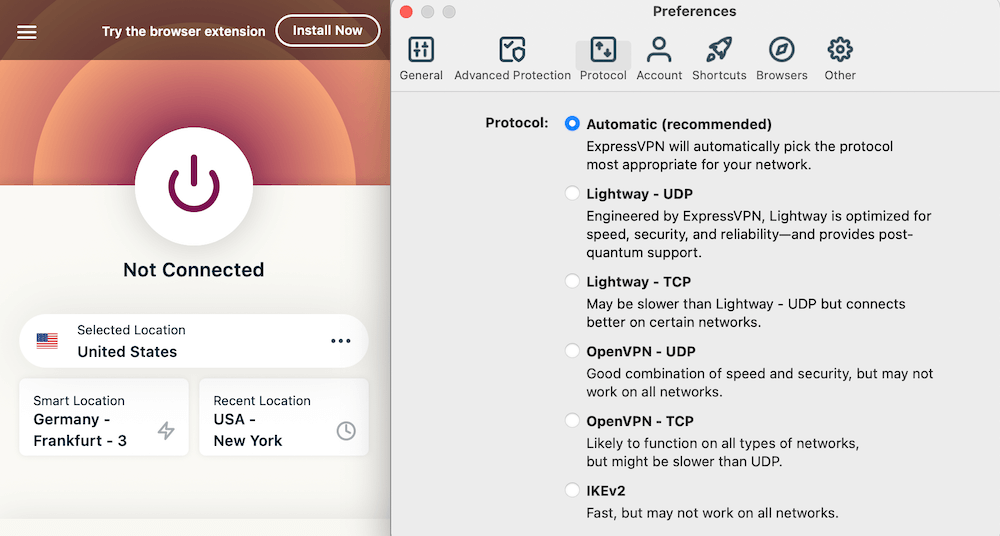
Both VPNs feature perfect forward secrecy (PFS), which protects your encrypted sessions from future attacks by regularly changing the encryption keys. PFS is a good counter against an attacker who may record and save your encrypted messages now in the hopes of decrypting them in the future with better technology.
Encryption Tests
The best way to check if a VPN does indeed encrypt your traffic is to connect to a server and run the encrypted connection through Wireshark. Here are my test results for ExpressVPN and Proton VPN.

The above screenshots show a confusing mix of symbols and numbers. That’s what successful encryption looks like. If a hacker intercepts your online traffic, they can’t do anything with this scrambled data.
Security Breaches
Neither Proton VPN or ExpressVPN have experienced a security breach that compromised the safety of their users. This is particularly impressive for ExpressVPN, which has been active for 15 years.
Tie. Both VPNs successfully passed my encryption tests. Each offers a variety of secure protocols, and they have never experienced a security breach.
Privacy
A good VPN doesn’t store user logs in case a server gets seized — something that has happened to some VPNs. Unreliable VPNs can also misuse your logs by selling or sharing them with third parties.
Fortunately, both ExpressVPN and Proton VPN adhere to strict no-logging policies that have been independently audited. They also stick to jurisdictions outside the Five Eyes alliance where seizing customer data is difficult; ExpressVPN is headquartered in the British Virgin Islands, and Proton VPN is based in Switzerland.
RAM-Only Servers
RAM-only servers operate on volatile memory where data is automatically and periodically wiped, leaving nothing that can be retrieved now or in the future. This makes a no-logs policy even more formidable. ExpressVPN offers RAM-only servers, but Proton VPN does not, which makes ExpressVPN a marginally better VPN for privacy than Proton VPN.
The last time Proton VPN significantly changed its servers’ privacy level was in 2019 when it added full-disk encryption to counter man-in-the-middle attacks.
Just to be clear, the lack of RAM-only servers doesn’t imply that Proton VPN is unreliable. Audits have proved that it doesn’t store user logs, and it’s never turned any information over to investigators, even when ordered by a court. Even so, having RAM-only servers would improve its user privacy score significantly.
Proton VPN does have special Secure Core servers designed to enhance your privacy, which I’ll discuss in detail in the “key features” section.
Independent Audits
Securitum concluded its most recent Proton VPN audit on April 26, 2023. The audit primarily focused on the no-logs policy; nothing suspicious was found. Furthermore, Proton VPN’s no-logging policy was tested in 2019 when a court ordered it to turn over user logs in a case. Proton VPN couldn’t comply since the logs didn’t exist in the first place.
ExpressVPN’s privacy policy was first audited in June 2019 by PwC Switzerland. In May 2022, Cure53 conducted an audit focusing on its TrustedServer technology (the tech behind ExpressVPN’s RAM-only infrastructure). KPMG performed another no-logs policy audit in September 2022. Not a single issue was found in any of these third-party audits.
ExpressVPN also proved that it stood by its zero-logging policy when the Turkish authorities seized one of its servers in 2017, and no information on any user was found.
Winner: ExpressVPN wins this round because it has RAM-only servers that offer better privacy. However, both VPNs have zero-logging policies that reputable security companies have audited.
Key Features
A virtual private network offers more than just encryption. ExpressVPN and Proton VPN have several key features designed to ensure that your online safety is rock solid.
Split Tunneling
Split tunneling is available on both VPNs, letting you choose which apps to route through the VPN and which to exclude.
- ExpressVPN’s split tunneling is available on Windows, macOS and Android — but it only splits traffic by apps, not websites.
- On Proton VPN, split tunneling is offered on Windows and Android, and you can exclude or include both apps and web URLs.
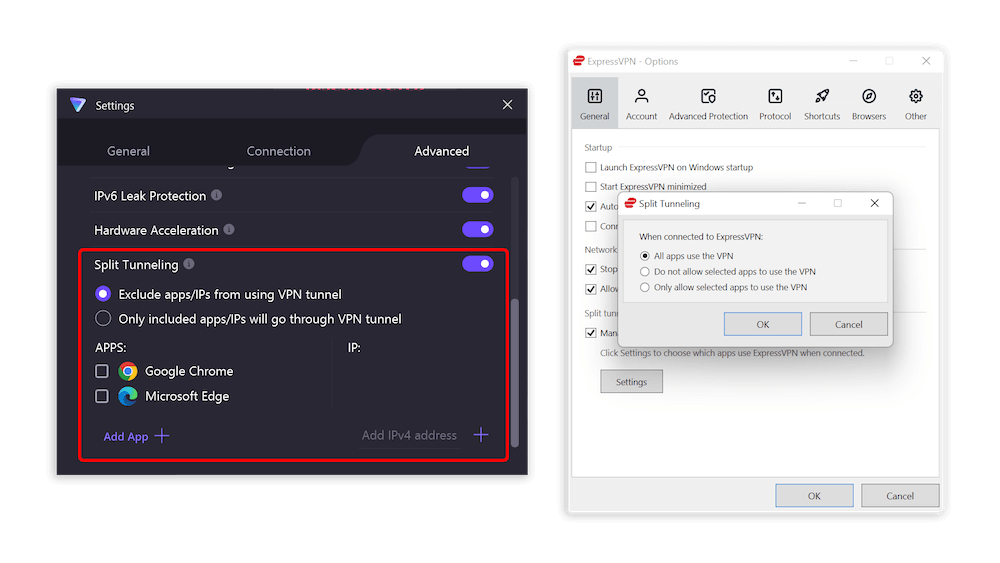
Kill Switch
You can prevent IP and DNS leaks on Proton VPN and ExpressVPN through a reliable kill switch. A kill switch turns off your internet when your VPN connection drops and keeps it that way until the VPN connection is restored. On ExpressVPN, it’s called Network Lock, and it’s available on Windows, macOS, Android, iOS and Linux.
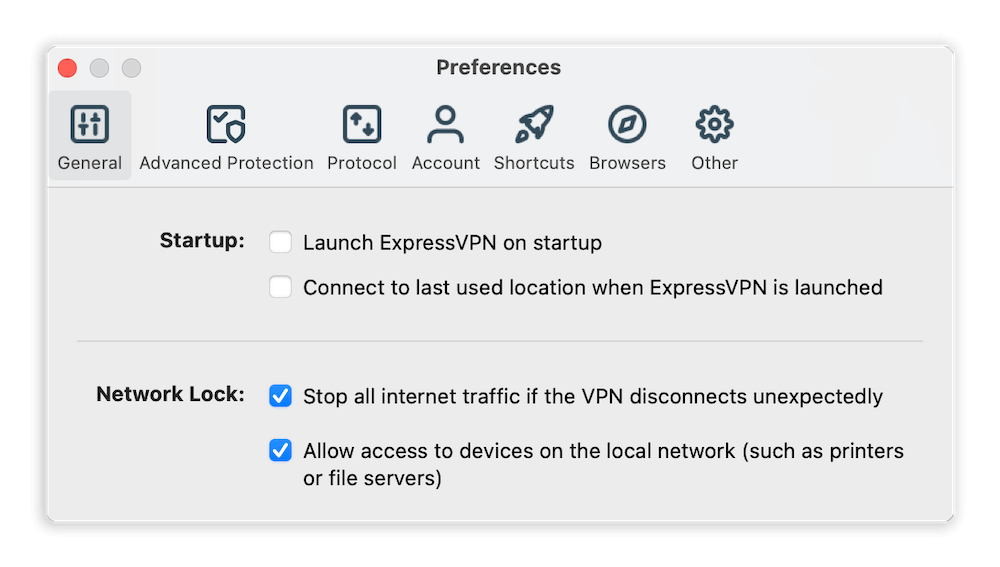
Proton VPN’s kill switch differs slightly depending on the operating system you’re using. On macOS, iOS and Android, you get the regular kill switch. Proton VPN for Windows and Linux has an extra option called a permanent kill switch, which doesn’t allow you to access the internet without an active VPN connection. It remains active even when you restart your device.
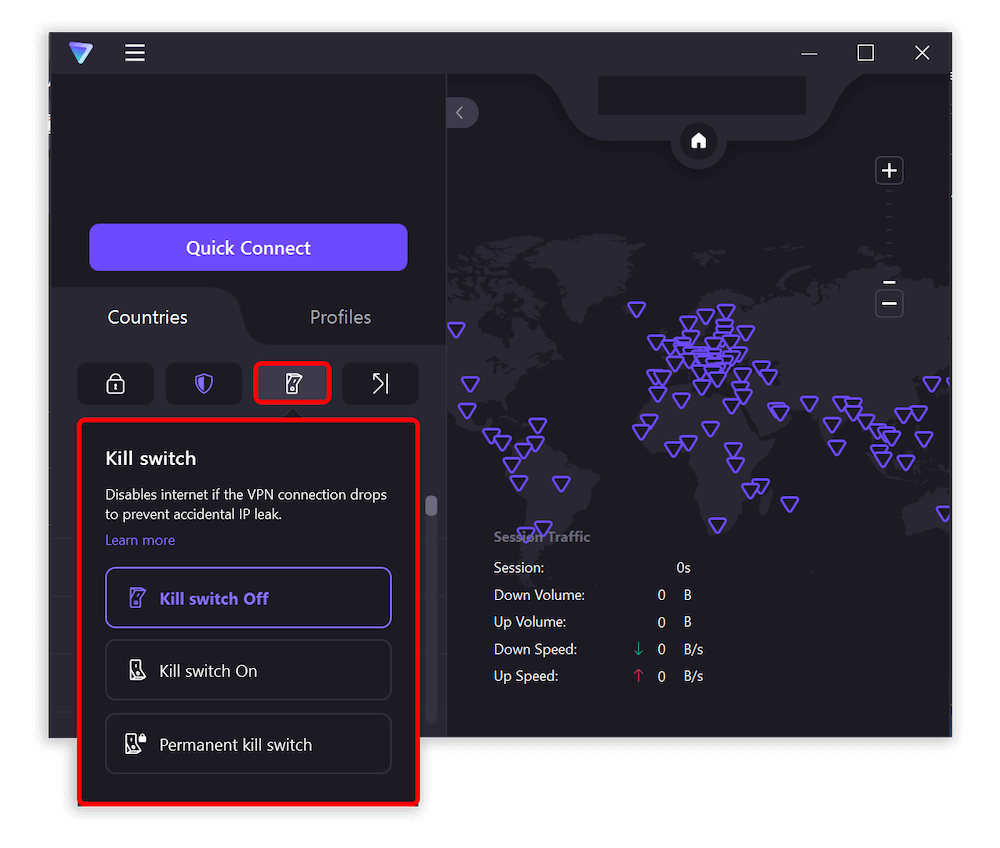
Ad & Malware Blockers
Another key function that ExpressVPN and Proton VPN share is an ad and malware blocker. These features prevent ads, trackers and malware from loading on your device when you encounter them online.
ExpressVPN has a Threat Manager for blocking trackers and malicious sites, an ad blocker for blocking ads, and parental controls for blocking adult sites. All three are grouped under an “advanced protection” tab available on Android, iOS, Windows, macOS, Linux and ExpressVPN Aircove. Apple TV users get the tracker and ad blockers only.
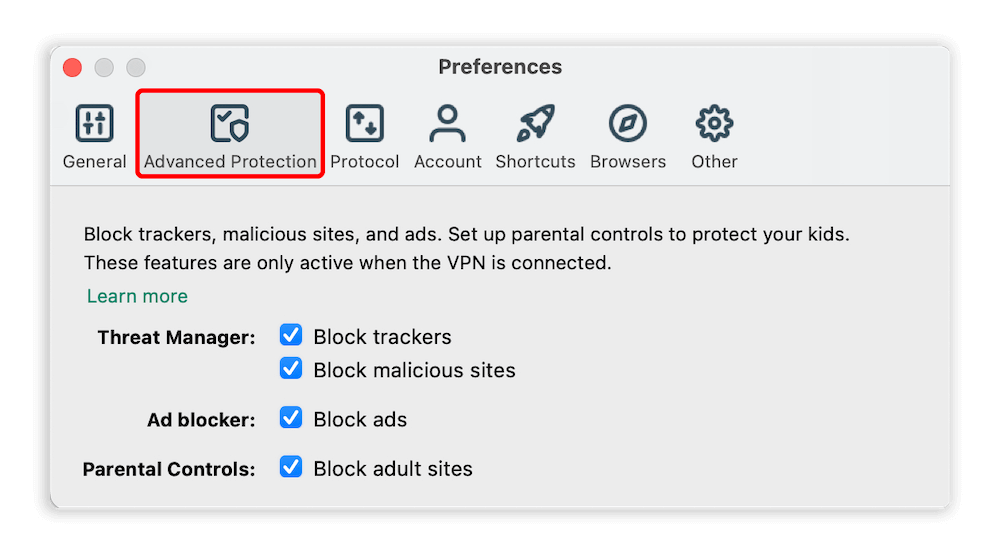
Proton VPN has an ad blocker called NetShield that improves browsing by limiting the number of ads, trackers and malware on web pages. NetShield is available on Windows, macOS, Linux, Android and iOS.
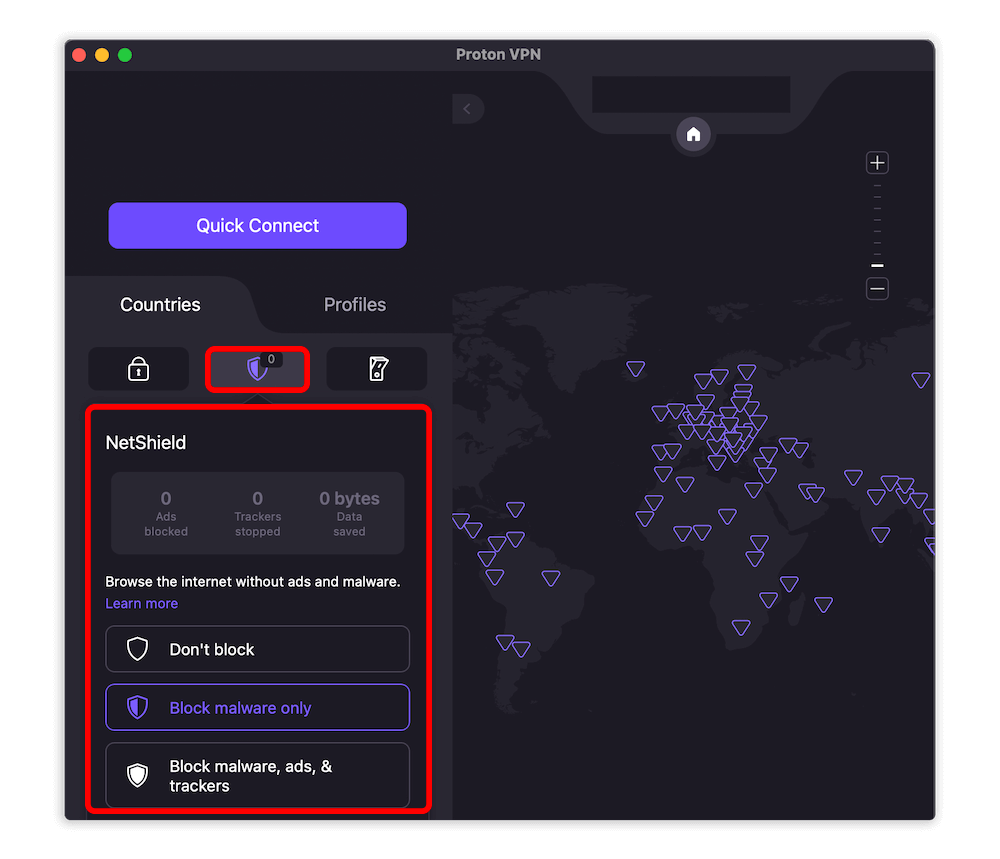
Obfuscation
You can also use obfuscation on both VPNs to bypass networks that block VPNs. Schools, workspaces and highly censored regions, like Russia, are known to block VPNs in order to keep tabs on what people are browsing. On ExpressVPN, the obfuscation works automatically across all servers and protocols, switching you to an obfuscated server when it detects VPN blocks.
To use obfuscation on Proton VPN, you must switch to the Stealth VPN protocol. This protocol uses TLS tunneling over TCP, making your VPN connection look like a regular HTTPS connection.
Port Forwarding
Heavy torrent users will be happy to know that both VPNs support port forwarding on some devices. Port forwarding increases the number of peers your device can communicate with, boosting the overall file transfer rate and speeding up downloads.
Proton VPN allows port forwarding on Windows and Linux. ExpressVPN supports port forwarding on routers, but your forwarded ports will be outside the VPN tunnel, so you won’t have encryption. We’ve got a full guide on torrenting with ExpressVPN that has more details.
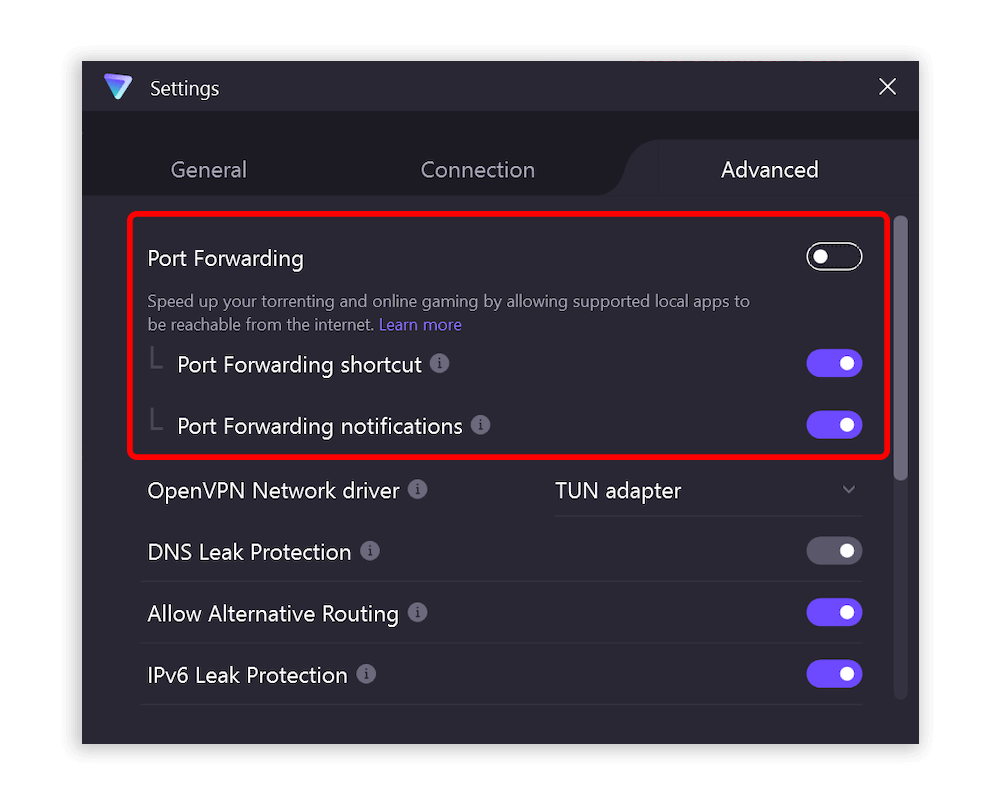
Specialty Servers
Proton VPN is also equipped with specialty servers. These include streaming servers, P2P servers optimized for BitTorrent, and Tor Over VPN servers that route traffic through a Tor network for extra privacy. This happens automatically, so you don’t need to manually connect to the Tor Browser.
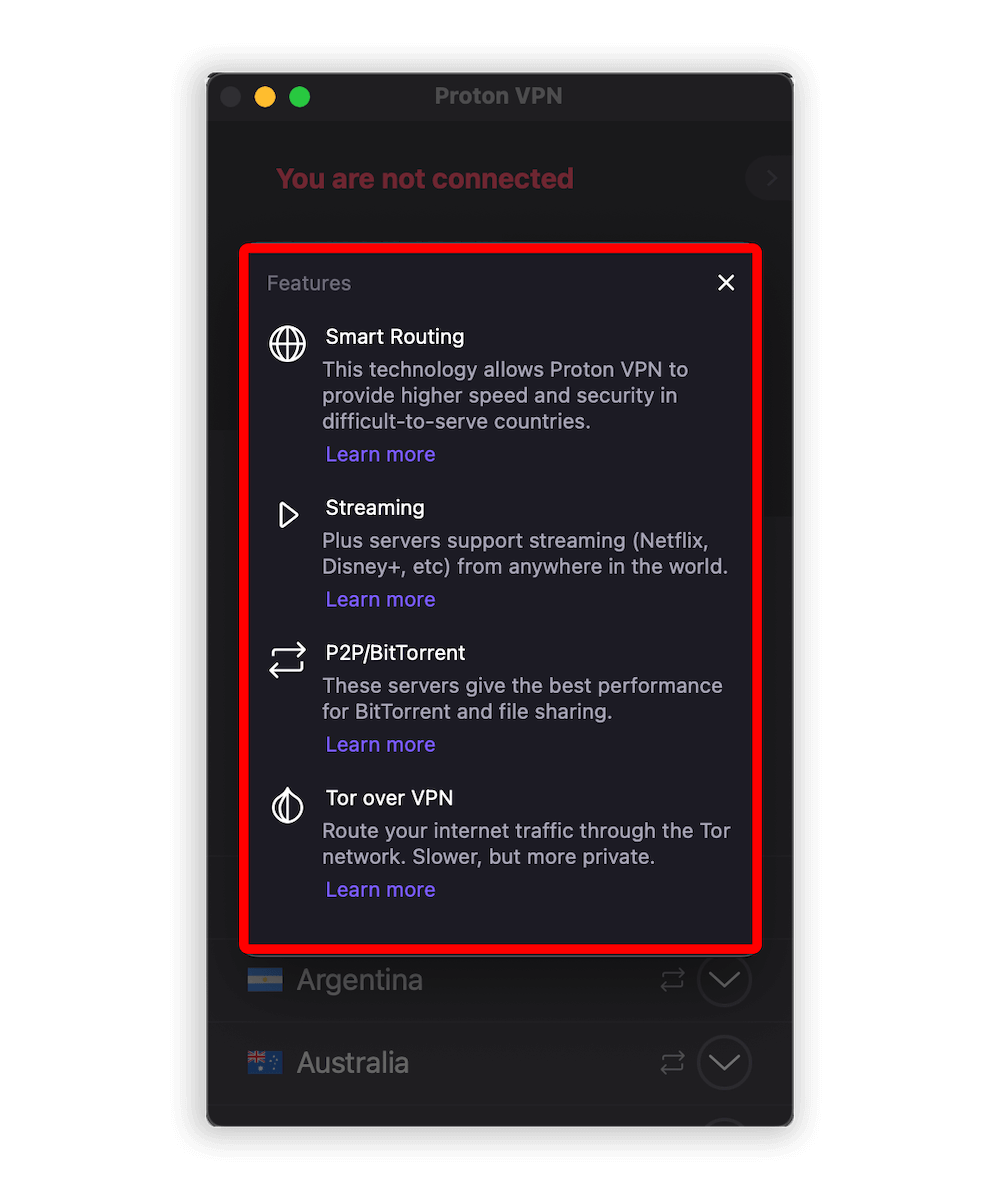
Proton VPN also offers double VPN servers, called Secure Core servers.They improve your privacy and data security by adding a second stop to each VPN connection, which routes your traffic through privacy-friendly locations like Switzerland, Iceland and Sweden. Currently, Proton VPN lets you choose from 107 Secure Core servers.
The VPN accelerator is a Proton VPN feature that can boost speeds by up to 400%, according to the VPN service. My curiosity couldn’t let that slide, so I tested it out — but I didn’t register a huge speed jump. I got 29 Mbps without the accelerator and 30 Mbps with it.
Winner: Proton VPN wins this category because it offers port forwarding across multiple devices compared to ExpressVPN, which only supports it on routers. It also has double VPN servers.
Speeds: Upload, Download and Ping
Your ability to stream, download and play online games depends on your VPN’s connection speeds. Our team tested ExpressVPN with Lightway and Proton VPN with WireGuard from Croatia, using servers in six locations with my unprotected connection speeds of 292.49 Mbps.
ExpressVPN Speed Tests
| Location: | Latency (ms) | Download (Mbps) | Upload (Mbps) |
|---|---|---|---|
| 🇭🇷 Croatia* | 12 | 292.49 | 29.4 |
| 🇬🇧 UK1 | 40 | 282.78 | 27.81 |
| 🇺🇸 New York | 129 | 246.39 | 26.83 |
| 🇿🇦 South Africa | 191 | 213.01 | 26.09 |
| 🇧🇷 Brazil | 230 | 186.75 | 27.10 |
| 🇦🇺 Australia | 316 | 153.64 | 22.14 |
| 🇯🇵 Japan | 366 | 142.86 | 25.23 |
| Average: | 183.43 | 216.85 (25.86% lost) | 28.37 (3.5% lost) |
1. fastest server
ExpressVPN registered impressive speeds regardless of the server distance. The U.K. server was the fastest location, giving me 282.78 Mbps, a 3.32% speed drop, while Japan was the slowest at 142.86 Mbps, a 51.16% speed drop. All the locations handled streaming and gaming without issues.
Proton VPN Speed Tests
| Location: | Latency (ms) | Download (Mbps) | Upload (Mbps) |
|---|---|---|---|
| 🇭🇷 Croatia* | 12 | 292.49 | 29.4 |
| 🇬🇧 UK1 | 54 | 279.92 | 10.95 |
| 🇷🇼 Rwanda | 157 | 276.76 | 28.06 |
| 🇧🇷 Brazil | 242 | 254.49 | 26.81 |
| 🇺🇸 New York | 117 | 248.40 | 27.01 |
| 🇯🇵 Japan | 282 | 166.02 | 22.42 |
| 🇦🇺 Australia | 389 | 141.03 | 20.42 |
| Average: | 179 | 237 (18.98% lost) | 23.58 (19.79% lost) |
1. fastest server
Proton VPN was faster than ExpressVPN, with the United Kingdom at the top with 279.92 Mbps, a 4.29% speed drop.Australia was the slowest location with 141.03 Mbps, a 51.78% speed drop, which was still enough for buffer-free streaming and gaming without buffering or lags.
Winner: Tie. Proton VPN averaged better download speeds across six locations with losing only 18.98% of overall speeds, which was faster than ExpressVPN’s loss of 25.86% average at the same locations. However, ExpressVPN had impressive upload speeds (losing 3.5% on average ), which makes it a better VPN for uploading files, compared to Proton VPN’s 23.58% average speed loss.
Streaming Performance
Most people use VPNs to access restricted streaming services and watch their favorite shows without buffering. I tried unblocking seven top streaming platforms with ExpressVPN and Proton VPN; the results are shown in the table below.
| Platform: | ExpressVPN | Proton VPN |
|---|---|---|
| Netflix | Yes | Yes |
| Hulu | Yes | Yes |
| Amazon Prime Video | Yes | Yes |
| Max | Yes | Yes |
| Disney+ | Yes | Yes |
| Peacock TV | Yes | Yes |
| BBC iPlayer | Yes | Yes |
On my first attempt, both VPNs unblocked streaming platforms including Netflix, Hulu, Amazon Prime, Max, Disney+, Peacock TV and BBC iPlayer. There were no delays or long loading times, either. Both providers easily made our best Netflix VPN roundup.
Tie: This was a tie as both VPNs unblocked all the streaming platforms I tried to access.
Server Network
A huge server network comes with two key advantages: You can unblock more restricted content, and you’re less likely to end up in an overcrowded server that affects the VPN’s overall performance. Here’s how the two VPNs fared in this category.
ExpressVPN Server Spread
ExpressVPN has servers in 163 locations spread across 105 countries. The table below shows the global distribution.
| Region: | Countries | Locations |
|---|---|---|
| North America | 14 | 40 |
| South America | 9 | 10 |
| Europe | 47 | 65 |
| Asia | 25 | 32 |
| Africa | 6 | 6 |
| Oceania | 2 | 8 |
| Middle East | 2 | 2 |
North America, Europe and Asia have a combined total of 137 locations in 86 countries, making them the most covered regions. Africa (six servers) and the Middle East (two servers) have the fewest locations, something I hope ExpressVPN will improve soon. South America has 10 locations, while Oceania has eight.
Proton VPN Server Spread
Proton VPN has servers in 119 locations across 91 countries. Here’s how they’re spread across the globe.
| Region: | Countries | Locations |
|---|---|---|
| North America | 6 | 21 |
| South America | 7 | 7 |
| Europe | 40 | 43 |
| Asia | 18 | 22 |
| Africa | 14 | 14 |
| Oceania | 2 | 6 |
| Middle East | 4 | 6 |
Proton VPN has fewer server locations than ExpressVPN, with most located in Europe, North America and Asia. However, Proton VPN has a better presence in Africa, with an impressive 14 locations. It also has more servers in the Middle East (six) than ExpressVPN, which only has two.
Winner: ExpressVPN wins this category by a significant margin, though it still needs to improve its coverage in the Southern Hemisphere.
OS Support & Usability
ExpressVPN works on Windows, macOS, Linux, iOS, Android, Fire TV, Apple TV and Chrome. The ExpressVPN Aircove router comes with a dashboard app, which is something that other router VPNs lack. You can connect up to eight devices simultaneously on the same ExpressVPN account.
You can also use ExpressVPN on devices that are incompatible with VPN apps through the “SmartDNS” feature called MediaStreamer. It comes with set locations in the U.S. that let you unblock streaming content exclusive to the region. No encryption is involved, which gives you better speeds than a regular ExpressVPN app, though security is worse.
Proton VPN is compatible with Android, iOS, Windows, macOS, Chrome, Firefox, Chromebook and Android TV. You can also install it on routers that support OpenVPN or WireGuard as a client. Proton VPN doesn’t have SmartDNS,but you can connect up to 10 devices simultaneously.
Ease of Use
When you launch the ExpressVPN app, you can connect to a smart location that gives you the fastest server. There’s a search function for finding any server you want, or you can open the server list, which is grouped by continent to make it easier to find what you need.
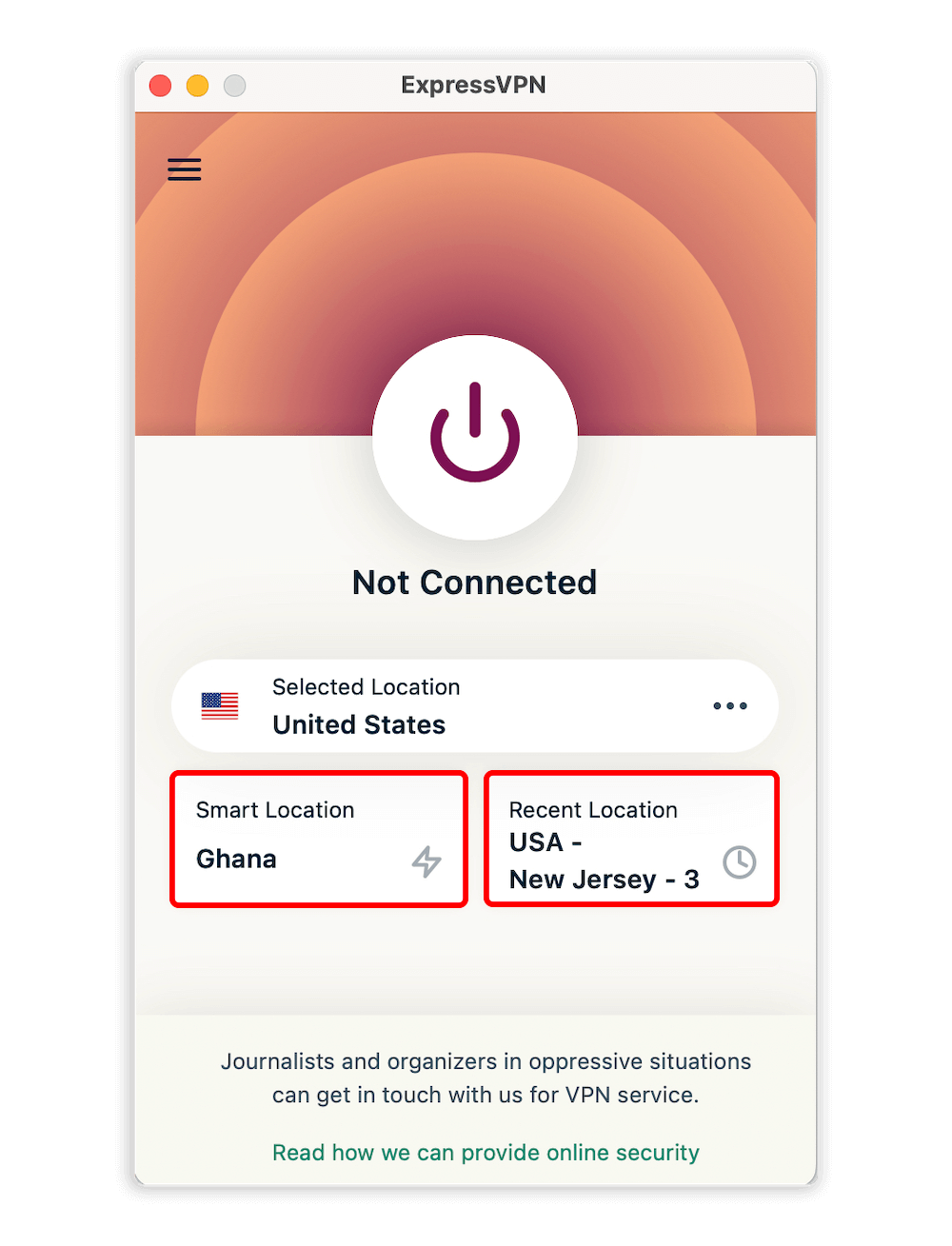
The app settings give you access to secure VPN protocols, split tunneling and advanced protection features like Threat Manager. Overall, navigating the ExpressVPN app is easier for first-time users.
Proton VPN also has an amazing user interface, and I love the “dark mode” feature, which is easy on the eyes. The first thing you see when you launch the app is a “quick connect” button that connects you to the fastest server. The locations are arranged alphabetically for easy scrolling, and there’s also a search function.
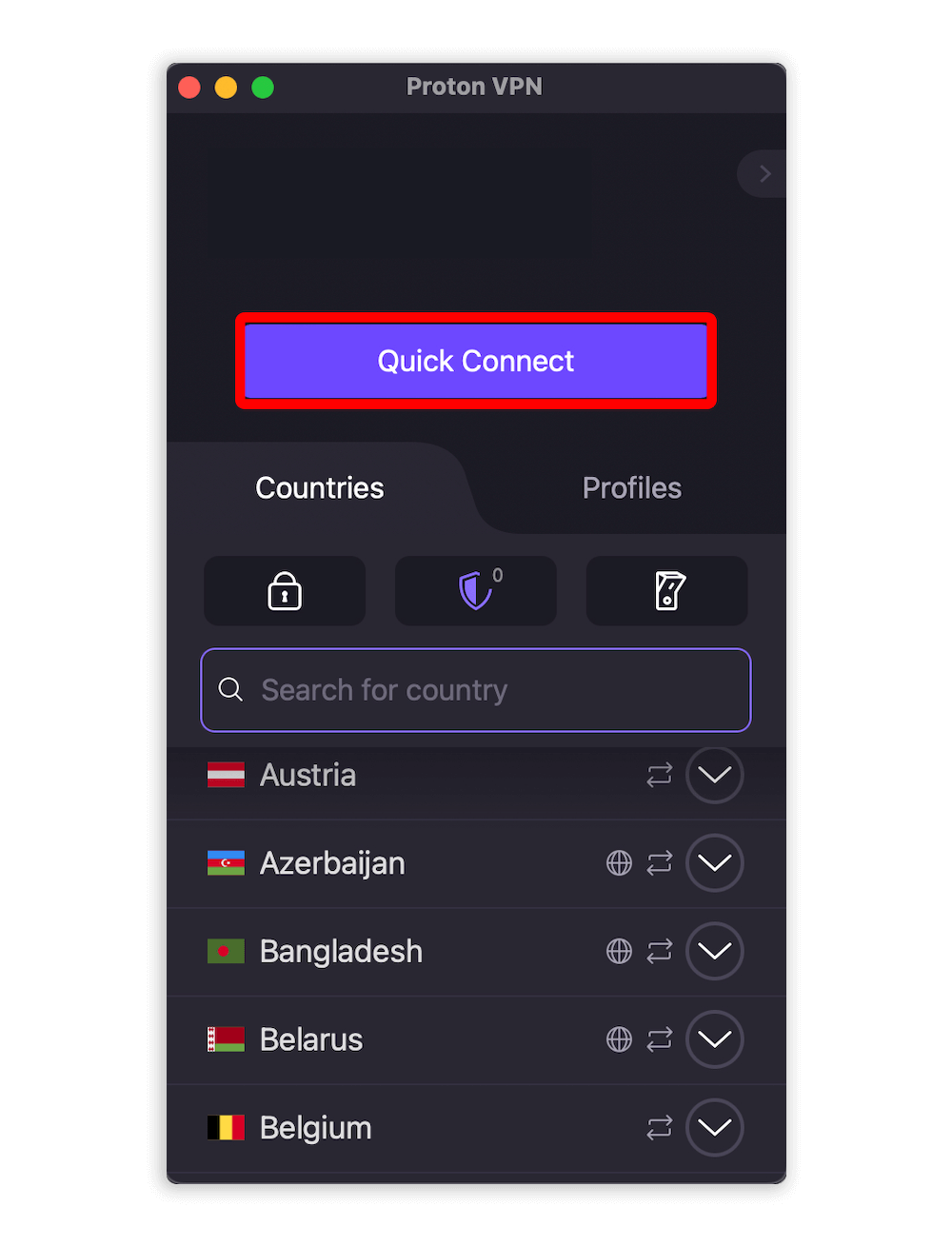
Everything else, like VPN protocols, the kill switch, split tunneling and NetShield, can be accessed from the app settings. However, the Windows version of Proton VPN packs a lot more features than the macOS, iOS and Android apps. For example, only Windows and Linux have port forwarding,and only the Windows, Linux and macOS apps offer IPv6 leak protection.
The macOS version doesn’t even have split tunneling. These discrepancies in functionality can confuse new users. On the other hand, ExpressVPN offers most of its functions on all operating systems. You can switch from Windows to Android and still access the essential features in the same places.
Winner: Both VPNs are user-friendly, but ExpressVPN won this round because it’s much easier to use. Additionally, ExpressVPN has a unique router with the VPN preinstalled and a native app; no other VPN matches that.
Plans & Pricing
ExpressVPN is one of the costlier VPNs, while Proton VPN is more affordable and has a free version you can use for as long as you need. All ExpressVPN and NordVPN plans include a 30-day money-back guarantee. Let’s compare the plans to see which is better for your pocket.
Proton VPN vs ExpressVPN Pricing
| Plans: | ExpressVPN | Proton VPN |
|---|---|---|
| Free plan | N/A | Yes |
| 1 month | $12.95 per month | $9.99 per month |
| 6 months | $59.94 for six months ($9.99 per month) | N/A |
| 12 month | $99.84 per year ($6.67 per month)* | $59.88 per year ($4.99 per month) |
| 24 months | N/A | $107.76 for first two years ($4.49 per month) |
The interesting bit about Proton VPN is the free plan, which is one of the best I’ve ever used. You can access five free locations, but you can’t choose your location unless you install the VPN on a router. The free version also has no monthly data caps. That’s enough for basic things like unblocking geo-restricted content while securing your online activities.
Winner: Proton VPN wins this category. The free version is reliable and practical for anyone on a tight budget, and its premium plans are also more affordable. Nevertheless, ExpressVPN offers good value for your money despite its steep price.
Customer Support
For this section, I reviewed the number of communication channels available to VPN users and tested how fast each service responded to urgent issues.
The live chat option is the fastest way to solve your ExpressVPN issues. It’s one of the quickest I’ve ever used, and the chatbot connects you to a live agent when you make a request. You can email customer support directly, although the responses usually take up to 48 hours, so only use that if the live chat isn’t available.
Other resources include an FAQ section with quick answers to common issues and video tutorials showing you how to install ExpressVPN apps on different operating systems.
Meanwhile, Proton VPN has a live chat option but limits it to premium customers only. You must sign into your premium account before that option is made available, which is inconvenient. The support center page groups all potential issues into different categories. For example, there’s a category for accounts, download and setup, billing, troubleshooting and more.
You can email support directly by filling out a contact form or messaging them through [email protected].
Winner: ExpressVPN wins this category for having an easily accessible live chat with fast-responding agents.
Conclusion: Why I Think ExpressVPN Wins Overall
This was a close race that ExpressVPN won by a whisker. ExpressVPN offers slightly better privacy bolstered by RAM-only servers. It also has a bigger server network, better device compatibility and better customer support.
Proton VPN may have lost the battle, but it went down swinging. It’s cheaper than ExpressVPN, and it’s equipped with some amazing extra features that make things easier for you. It even went toe-to-toe with ExpressVPN on the security front, something that most VPNs rarely pull off in my comparisons.
Do you agree with the results, or do you feel that Proton VPN would fit your VPN needs better? Have you used any other VPNs besides these two, and was your experience better in any way? Tell us what you think, and thank you for always reading our content.
Methodology: How I Compared ExpressVPN and Proton VPN
Here’s my methodology for comparing these two VPNs.
Other VPN Alternatives I Like
- NordVPN: Fast Speeds With Reliable Security
NordVPN is a speed monster with an impressive server network that can easily get you past most geo-restrictions. Like Proton VPN, it comes with specialty servers like P2P and Onion Over VPN. We discuss the service more in our NordVPN review.
- Surfshark: Unlimited Simultaneous Connections
In addition to being affordable, Surfshark lets you connect an unlimited number of devices simultaneously through the same account, making it perfect for large households. It’s also a fast VPN; you can see all the speed tests in this Surfshark review.
- CyberGhost: User-Friendly Apps
If you’re looking for an affordable VPN that’s easy to navigate for new users, try CyberGhost. It has an impressive server spread, including specialty servers for streaming, gaming and torrenting. Our CyberGhost review explores all that and more in greater detail.
FAQ: ExpressVPN vs Proton VPN Comparison
Is There a Better VPN Than ExpressVPN?
NordVPN is an alternative that could be better than ExpressVPN. It boasts superior speeds and has a large server network. It also comes with extra security features like a double VPN, an ad and malware blocker, and a dark web monitor.What Are the Disadvantages of Proton VPN?
Some key disadvantages of Proton VPN include the lack of RAM-only servers, a live chat limited to premium customers only, and a free version that only lets you connect a maximum of one device.Which VPN Is Better Than Proton?
ExpressVPN is a good example of a VPN that’s better than Proton VPN. It offers better customer support options, a larger server network, better device compatibility and RAM-only servers.Is Proton VPN Trustworthy?
Proton VPN is a trustworthy VPN. It adheres to a strict no-logs policy that has never been breached and has been audited by third parties. It also uses encryption that’s almost impossible to crack.

Leave a Reply